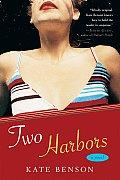Review: Two Harbors by Kate Benson

The words Dex and Stone do not appear together anywhere in the first 100 pages of Kate Benson's recent first novel Two Harbors. I had noticed the name of the protagonist's lover in a synopsis, and it's one of those details that can really prejudice a reader, so I read with trepidation for awhile. The handsome interloper, had he come to my hometown and taken a railroad job away from an unemployed local family, would have gone undercover as Art Ruberg or Ricky Wiita (or, if he really wanted to disappear, Brad Johnson, which doubles back to the princely quarterback connotation).
But Dex did not arrive in my hometown; he populates Benson's fictional Minnesota port town of Two Harbors, a place mostly lacking authenticity aside from the frigid lake beyond. And her novel is not about the handsome interloper, but the lover he leaves behind, a beautiful and precocious local fledgling named Casey who wears the hairshirt of her mother's pageant-queen, footlights, cuckoo legacy. Kate Benson loves adjectives even more than I love a gaudy mixed metaphor, decorating her early paragraphs with "balloons in bubbly bursts" and "wispy blue streamers." (Quoth the maven: avoid describing nouns that imply the description.) Early on, I sensed that this novel takes place in the near future on a soundstage somewhere in Van Nuys, hopefully with a face like a young Cate Blanchett's in the lead role, and a navel to match; that would at least make the many closeups interesting.
After those first 100 pages, however, Benson stashes the dollhouse and grinds out some compelling passages. The mother-as-refugee-to-Hollywood motif creates a big pit of longing around which this story plausibly orbits. Benson has the patience to tease out the essense of her improbable heroine and tend the garden of dysfunction from which she sprouted. Casey pursues a passion for cinema far from the cultural hearth--did somebody mention Ed Chigliak?--and Benson frequently embeds a cinematic sensibility in her prose. Of course, this conceit tends to read like screenplay, mostly to its detriment. I suppose Two Harbors is an ideal counter-point to Hollywood, its name serves up a handy metaphor, and it did celebrate Winter Frolic for decades--one of its annual midwives was a gay man who sold shoes.
There are writers, and there are doers, and Benson is still a writer. Perhaps she'll seize the opportunity during her nascent adulthood to do some things as well, and distance herself from the too-fecund ivy of the writers' academy and her fickle relationship with place, time, and scene. (Indeed, you can detect this transition in the course of her writing this novel.) The world is bones and rock, first breaths and last, not just post-adolescent circumspection behind hanging drapes of gauzy tulle. For this reader, Benson's Dex Stone, heavy petting, and streams of psycho-hygiene were seldom engaging. Unless you've recently canceled a subscription to Seventeen, this read probably won't thrill you either.
(Incidentally, "Two Harbors" is also the title of a recent indie movie set in the Agate City directed by Minneapolitan James Vculek, and starring Catherine E. Johnson and Alex Cole. I was trying to track the film down when I stumbled upon Benson's novel, which, as it turns out, describes a fictional movie with the same title. Fortunately, I never thought to wedge that notion into my novel, Eating Crow (a recent revision to be serialized here at South of the Taiga in the near future).)

<< Home